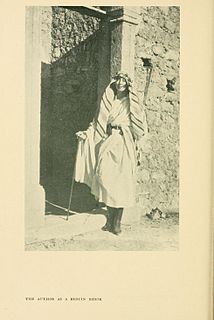A Quote by Moshe Vardi
Humanity is about to face perhaps its greatest challenge ever, which is finding meaning in life after the end of 'In the sweat of thy face shalt thou eat bread.'
Related Quotes
The first recorded instruction given to Adam after the Fall dealt with the eternal principle of work. The Lord said: "In the sweat of thy face shalt thou eat bread." (Gen. 3:19.) Our Heavenly Father loves us so completely that he has given us a commandment to work. This is one of the keys to eternal life. He knows that we will learn more, grow more, achieve more, serve more, and benefit more from a life of industry than from a life of ease.
Wouldst thou know the lawfulness of the action which thou desirest to undertake, let thy devotion recommend it to Divine blessing: if it be lawful, thou shalt perceive thy heart encouraged by thy prayer; if unlawful, thou shalt find thy prayer discouraged by thy heart. That action is not warrantable which either blushes to beg a blessing, or, having succeeded, dares not present a thanksgiving.
Owe no man any thing, but to love one another: for he that loveth another hath fulfilled the law. For this, Thou shalt not commit adultery, Thou shalt not kill, Thou shalt not steal, Thou shalt not bear false witness, Thou shalt not covet; and if there be any other commandment, it is briefly comprehended in this saying, namely, Thou shalt love thy neighbour as thyself.
I know that I shall have lost to the jungle if I take a weak moral standpoint or relax my mental punctiliousness. I have therefore come to a certain belief which is based on three powerful effective commandments: THOU SHALT BE ENTERTAINING AT ALL TIMES. THOU SHALT OBEY THY ARTISTIC CONSCIENCE AT ALL TIMES. THOU SHALT MAKE EACH FILM AS IF IT WERE THY LAST.
Wouldst thou learn thy Lord's meaning in this thing? Learn it well: Love was His meaning. Who shewed it thee? Love. What shewed He thee? Love. Wherefore shewed it He? For Love. Hold thee therein and thou shalt learn and know more in the same. But thou shalt never know nor learn therein other thing without end. Thus was I learned that Love was our Lord's meaning.
Beneficence is a duty. He who frequently practices it, and sees his benevolent intentions realized, at length comes really to love him to whom he has done good. When, therefore, it is said, "Thou shalt love thy neighbor as thyself," it is not meant, thou shalt love him first and do him good in consequence of that love, but, thou shalt do good to thy neighbor; and this thy beneficence will engender in thee that love to mankind which is the fulness and consummation of the inclination to do good.
Solitude delighteth well to feed on many thoughts;
There as thou sittest peaceful, communing with fancy,
The precious poetry of life shall gild its leaden cares;
There, as thou walkest by the sea beneath the gentle stars,
Many kindling seeds of good will sprout within thy soul;
Thou shalt weep in Solitude,--thou shalt pray in Solitude.
Thou shalt sing for joy of heart, and praise the grace of Solitude.
First shalt thou take out the Holy Pin. Then shalt thou count to three, no more-no less. Three shall be the number thou shalt count, and the number of the counting shall be three. Four shalt thou not count, neither count thou two, excepting that thou then proceed to three. Five is right out. Once the number three, being the third number, be reached, then lobbest thou thy Holy Hand Grenade of Antioch towards thy foe, who, being naughty in my sight, shall snuff it.






































